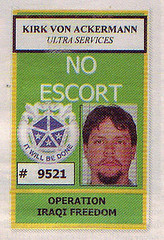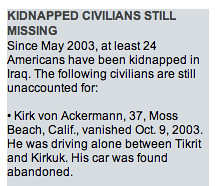Wednesday, April 18, 2007
We Get Mail
Background: Von Ackermann's badge was found among John Dawkin's belongings by a former colleague, Egeman Çakmak. It is my understanding that the circumstances surrounding the ID badge and Egemen Çakmak are much more complicated than publicly disclosed to date.
To avoid further confusion, included is a scan of the photo of Kirk von Ackermann's id badge which accompanied the print version of the article in Rolling Stone magazine, Death of A Contractor.
Saturday, April 14, 2007
The ID Badge
Dan Halpern wrote a wonderful piece for the Rolling Stone. His writing style appealed to the avid reader in me, capturing a bravado and adventurism I've always imagined must be present in Iraq.
On a more serious note though, Halpern's reporting of circumstances surrounding von Ackermann's ID badge raises some questions.
Death of a ContractorLet's address the "badge" first. Colin Freeman reported a "photo ID" in November 2003.
By Dan Halpern, Rolling Stone, March 8, 2007, Issue 1021
Then, while [Egeman] Cakmak was traveling with [John] Dawkins in Afghanistan that fall, trying to drum up new contracts, he stumbled across something that stopped him in his tracks. There, among Dawkins' possessions, was the Ultra Services badge that had belonged to Kirk von Ackermann, the official Defense Department identification that allowed him to be in Iraq. For Cakmak, it was a stunning discovery: Dawkins had previously said that the badge had never been recovered.
Cakmak confronted Dawkins. "Nobody found his passport or his badge?" Cakmak asked. Dawkins said no -- they hadn't ever found Kirk's passport, badge or gun.
Cakmak turned to [Bora] Tuncay. "He's lying," he said in Turkish. "Because I have the badge." Then, turning to Dawkins: "I found Kirk's Ultra Services badge in the office, while we were moving."
"Ah, the badge!" Dawkins said. "It wasn't missing. It came with the stuff CID gave me."
Cakmak didn't believe him. Dawkins had told him that CID had not returned von Ackermann's possessions until months after his disappearance. But Cakmak had discovered a scan of Kirk's badge on a laptop computer belonging to Dawkins. The scan was dated October 10th, 2003 -- the day after Kirk had disappeared.
"How does he have the badge that was around Kirk's neck to scan onto his computer the day after Kirk disappeared?" Cakmak says. "He has it because the men he hired to kill Kirk brought it to him as proof."
Bay Area civilian vanishes in IraqWe know from Freeman's second article that Ryan Manelick was a significant source for the above first on Kirk von Ackermann's disappearance. It's possible Manelick knew about the photocopies of the photo ID and told/showed Freeman. It shouldn't be too hard to find out.
By Colin Freeman, San Francisco Chronicle, November 11, 2003
At a U.S. Army checkpoint a few miles along the road from where von Ackermann disappeared, soldiers were issued with a photocopy of his photo ID several weeks ago. But during troop rotations, no information was passed on about the case, leaving the incoming troops unaware of who he was or why they even had his photo.
Çakmak's insinuations also raise questions about what appears to be a deliberate and on-going effort to pin the disappearance of von Ackermann on Dawkins even though CID has supposedly determined it was a botched kidnapping attempt by Iraqis (ref). Any way...
Back to that short sentence about the laptop:
But Cakmak had discovered a scan of Kirk's badge on a laptop computer belonging to Dawkins.That one sentence contains a very small but intriguing detail. What was Egeman Çakmak doing with John Dawkins' laptop?
In June 2004, the domain name server listed on the registration for Dawkin's company mesopotamiagroup.com was changed. The domain name server was switched to a co-located server in Turkey. A year later, in the summer of 2005, mesopotamiagroup.com was "hijacked." In order to accomplish this, access was needed to send an email from one very particular address: john@ultra-services.com
It's been a while since I've thought about who hijacked mesopotamiagroup.com?
Wednesday, April 11, 2007
Jeffrey Ake
A Hoosier's fate remains uncertain
By Will Higgins, The Indianapolis Star, April 11, 2007
Recent news reports have highlighted that the Ake family have had a hard time financially. With the large number of contractors now working in Iraq for United States agencies, is it really too much to ask that each and every contractor at least be covered by a minimum of insurance? Families shouldn't have financial stress added on top of the pain and worry of a missing family member.
See The Defense Base Act for more on the topic of insurance.
Friday, April 06, 2007
The Defense Base Act
In early 2005, I became aware that Kirk von Ackermann, a civilian contractor working in Iraq, was not covered by "insurance" when he disappeared on October 9, 2003. I sought to find out a) what was this "insurance" and b) why was it missing? The result of the ensuing two years of research -- in to what I would quickly learn was the Defense Base Act -- is a three-part series for ePluribus Media of which the first part is now available.
Part I traces how the lack of adequate insurance coverage impacts families. In particular, it goes into some detail on how lack of Defense Base Act coverage impacted the von Ackermann family.
Part II concentrates on how the appropriate Defense Base Act contract clauses that could have made a difference went "missing in action."
Part III focuses on the lack of information and access to low cost coverage for contractors based overseas.
Iraq, Contingency Contracting and the Defense Base Act
by Susie Dow, ePluribus Media, March 28, 2007
Established in 1941, the Defense Base Act (DBA) provides the equivalent of workers' compensation for civilian contractors working on contingency operations in overseas countries such as Iraq and Afghanistan. DBA provides benefits in the event contractors are injured, killed, or kidnapped in the course of their work for US government agencies such as the various branches of the Department of Defense, USAID, or the State Department. But this insurance is not automatic, employers must purchase it. And before they can do that, they must know about it.Parts II & III will be posted over the next several weeks. I'll update this post with links once available.
More...





